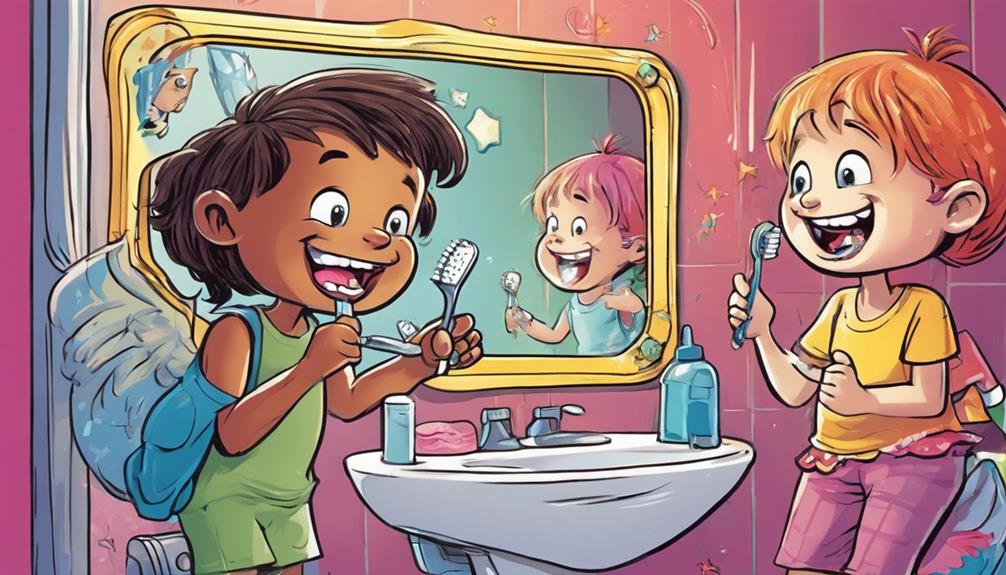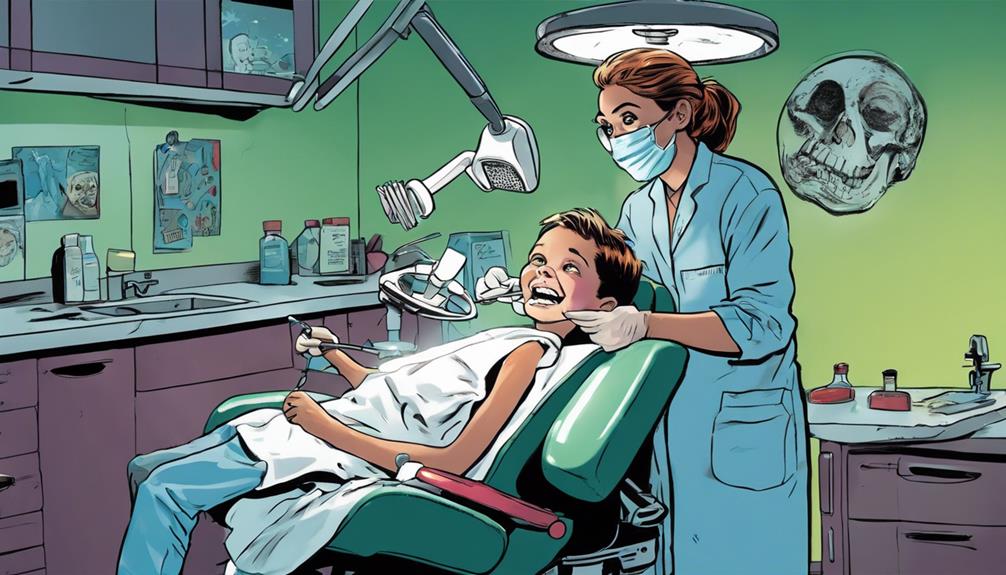There are several dental myths kids need to stop believing. For instance, brushing harder doesn't mean cleaner teeth—it can actually harm enamel and irritate gums. Flossing is essential; skipping it can lead to cavities. Bleeding gums aren't normal and may indicate dental issues. Regular dentist visits are important, even when you're not in pain. White teeth don't always equal good health, and sugar isn't the only cause of cavities. Also, thumb sucking often doesn't need intervention, and professional whitening is safe. Finally, not all wisdom teeth need to be removed. Discovering the truth behind these myths can greatly improve your dental health. It’s important for kids to learn the truth about dental care to prevent unnecessary damage to their teeth and gums. In addition to dispelling dental myths, it’s important for parents to be aware of hidden dangers in kids’ dental treatments, such as excessive use of fluoride or unnecessary tooth extractions. By staying informed and seeking out trustworthy dental care, kids can maintain healthy smiles for a lifetime.
Key Takeaways
- Brushing harder does not improve cleaning; gentle brushing protects enamel and gums while effectively removing plaque.
- White teeth do not always indicate good oral health; dental health is more than just tooth color.
- Flossing is essential; skipping it increases the risk of cavities and gum disease.
- Baby teeth are important for future dental alignment; neglecting their care can lead to issues later.
Brushing Harder Equals Cleaner Teeth

Brushing harder doesn't make your teeth cleaner; in fact, it can harm your enamel and irritate your gums. You might think that applying more pressure while brushing your teeth will lead to better oral hygiene, but that's a myth.
Gentle brushing with a soft-bristled toothbrush is the best way to keep your teeth and gums healthy. The American Dental Association recommends using light pressure and circular motions to effectively remove plaque without causing damage.
When you brush too hard, you risk gum recession, which exposes the roots of your teeth, making them more vulnerable to decay. Over time, this can lead to serious dental health issues, like cavities and gum disease. You don't want to put your smile at risk!
Instead of focusing on how hard you're brushing, pay attention to your technique. A proper brushing method helps you achieve ideal dental hygiene while protecting your enamel and gums.
Flossing Is Not Necessary

Many kids believe that flossing isn't necessary, but skipping this step can actually lead to hidden dental problems. Flossing is essential for effective dental care because it removes food debris and plaque between your teeth, areas that toothbrushes often miss. Without this important step, you increase your risk of developing dental issues like cavities and gum disease.
Flossing helps maintain gum health by preventing tartar buildup that can lead to gingivitis. When any two teeth touch, it's time to start flossing. Establishing a routine not only keeps your teeth cleaner but also helps you avoid painful dental visits down the line.
Even though some may argue that there's a lack of definitive evidence supporting flossing, the potential benefits are clear. Regular flossing can greatly reduce your risk of dental issues and improve your overall oral hygiene.
Bleeding Gums Are Normal

Bleeding gums aren't a normal part of dental care and can signal serious issues like gingivitis. If you notice bleeding gums while brushing or flossing, it's a clear sign that something's not right.
This could be due to plaque buildup, which requires immediate attention from a dental professional. Ignoring this problem might lead to advanced gum disease, tooth loss, and other complications that could seriously impact your oral health.
Regular dental visits are essential for identifying the causes of bleeding gums and ensuring your gums remain healthy. During these check-ups, your dentist can help you understand how to maintain proper oral hygiene practices.
Gentle brushing and regular flossing are key to preventing bleeding and promoting healthier gums.
Dentist Visits Are Only for Pain

Thinking that dentist visits are only necessary when you're in pain can lead to serious oral health issues down the line.
Many kids believe that if their teeth don't hurt, everything's fine, but that's not true. You could have cavities or gum disease lurking beneath the surface without any symptoms. Regular dental checkups every six months are essential for maintaining your teeth and overall health.
During these visits, your dentist can spot problems early, saving you from painful procedures or expensive treatments later on. It's much easier to address an issue before it becomes a bigger problem. Plus, dentists offer valuable preventive care and education, helping you develop good oral hygiene habits from a young age.
Ignoring the importance of these routine checkups can lead to complications that affect not just your teeth but your entire well-being.
So, don't wait for pain to visit the dentist! Embrace regular dental appointments as a key part of keeping your smile bright and your health in check.
White Teeth Mean Healthy Teeth

Just because teeth are white doesn't mean they're healthy, as tooth color can be influenced by various factors unrelated to oral health. You might think that bright, white teeth indicate strong dental health, but that's not always true.
Many people with yellow teeth can actually have healthy gums and no cavities. Focusing solely on appearance can lead to anxiety and distract you from what truly matters in dental health.
Consider these feelings:
- Worry that your smile doesn't look good enough.
- Confusion about what dental health really means.
Baby Teeth Don't Need Care

Many people believe baby teeth don't need care, but that couldn't be further from the truth. Even though they're temporary, baby teeth play an essential role in your child's ability to chew, speak, and maintain proper facial structure.
Neglecting their dental hygiene can lead to tooth decay, which is just as painful in baby teeth as it's in permanent ones. If untreated, cavities can cause infections that affect your child's overall health.
Healthy baby teeth also reserve space for their adult teeth. If they lose a baby tooth too early, it can lead to misalignment or impaction of permanent teeth. This can create long-term dental issues that require even more care later on.
It's vital to instill good dental hygiene habits early. This not only promotes a positive attitude towards oral care but also reduces anxiety during dental visits.
You should schedule your child's first dental visit by age one. This early appointment allows for the detection of potential issues and helps you learn proper care practices to guarantee your child's smile stays healthy.
Sugar Is the Sole Cavity Culprit

While caring for baby teeth is important, it's a common misconception that sugar alone causes cavities.
The real culprit is bacteria in your mouth. When these bacteria consume sugar, they produce acid that erodes your enamel, leading to cavities. It's not just sugar to blame; poor oral hygiene practices, like not brushing or flossing properly, play a significant role too.
Here are some things to reflect upon:
- Sticky foods cling to your teeth, giving bacteria more time to create cavities.
- Regular dental check-ups are essential to catch plaque buildup and prevent cavities.
Thumb Sucking Always Requires Intervention

Thumb sucking is a common behavior in young children and often doesn't need intervention unless it continues past age four. Most kids naturally stop this habit between ages two and four. If your child is still thumb sucking beyond that age, it could lead to potential dental alignment issues.
Prolonged thumb sucking can affect the position of teeth and the shape of the mouth, but early intervention can help correct these problems. Instead of using punitive measures, consider positive reinforcement strategies to gently encourage your child to reduce their thumb sucking habits. Rewarding small successes can be more effective than punishment.
If thumb sucking becomes a concern for your child's dental health, consulting with a pediatric dentist is a great step. They can provide tailored advice and strategies to manage the habit while ensuring your child's dental development remains on track.
Professional Whitening Damages Teeth

You might think that professional whitening can harm your teeth, but that's not true when it's done by a dentist.
In fact, these treatments are safe and effective, especially when you follow the right guidelines.
Many worries about damage come from using over-the-counter products incorrectly, so it's important to consult your dentist first.
Safe Under Supervision
Professional whitening treatments are safe and effective when performed under a dentist's supervision, guaranteeing minimal risk of damage to your teeth.
Unlike over-the-counter products, which can cause harm when misused, professional whitening follows strict protocols. Your dentist uses custom-fitted trays and controlled concentrations of whitening agents to protect your enamel and gum health while achieving stunning results.
Consider these points before opting for whitening:
- Your smile deserves the best care: Professional treatments prioritize your dental health.
- Avoid unnecessary pain and discomfort: A dentist guarantees the process is gentle and effective.
Regular consultations with your dentist can help assess your dental health and determine the safest options for achieving that dazzling smile.
With professional whitening, you don't have to worry about damaging your teeth or enamel. Instead, you can enjoy a brighter, healthier smile with peace of mind.
Remember, safety and effectiveness go hand in hand when you choose to whiten under professional guidance.
Misconceptions About Safety
Many people worry that professional whitening can damage their teeth, but when done under a dentist's care, it's actually safe and effective.
One of the common misconceptions about whitening safety comes from the fear associated with over-the-counter products. These products often lack the stringent safety standards that professional treatments uphold, leading to unfounded concerns about damage to your teeth.
Studies show that professional whitening, which typically uses hydrogen peroxide, effectively lightens teeth without causing significant harm to your enamel. Dentists use techniques that protect both your gums and enamel during the procedure, ensuring that your dental integrity remains intact.
By consulting with a dentist beforehand, you can address any worries and receive tailored recommendations that suit your needs.
Understanding these facts can help dispel myths around professional whitening. It's essential to know that when you choose to whiten your teeth under the supervision of a qualified dentist, you're prioritizing both safety and effectiveness.
Wisdom Teeth Always Need Removal

Not every wisdom tooth needs to be pulled; some can grow in just fine without causing problems. While it's true that many people do undergo wisdom teeth removal, it's vital to understand that this isn't a blanket necessity for everyone. In fact, some individuals have enough space in their mouths for these teeth to flourish without causing any dental health issues.
Consider these points:
- Pain and discomfort can often be avoided.
- Preserving natural teeth is usually better than removing them.
Research has shown that wisdom teeth can remain intact without adverse effects in many cases. A professional evaluation from your dentist is essential to determine whether removal is necessary for you.
It's also worth noting that preventive removal of asymptomatic wisdom teeth isn't always recommended. Instead, monitoring them might be the best approach.
Frequently Asked Questions
Why Poor Dental Hygiene in the Middle Ages Was a Myth?
You might think poor dental hygiene defined the Middle Ages, but evidence shows people used tools and natural remedies for oral care. They understood dental health, challenging the myth of universal neglect during that time.
Did You Know Dental Facts for Kids?
Did you know kids need to care for their baby teeth? They're essential for chewing and speaking. Starting dental visits early and using fluoride toothpaste can help keep those little smiles healthy and strong!
Why Don T Parents Take Their Kids to the Dentist?
Think of dental visits as the foundation of a house. Many parents overlook them, prioritizing other health appointments. They might fear costs or worry about their child's comfort, but neglecting dental care can lead to bigger problems.
What Is the #1 Reason Why People Don't Go to the Dentist and Suffer From Gum Disease?
The number one reason you might avoid the dentist is fear. That anxiety often grows from past experiences or misconceptions about pain, leading you to neglect regular visits and ultimately suffer from gum disease.
What are some common myths about dental health for kids that parents need to be aware of?
Many parents believe that baby teeth aren’t important, but they are crucial for guiding permanent teeth. Another myth is that sugary treats are okay as long as kids brush afterward, but it’s best to limit sugary snacks altogether. Good dental health tips for kids include regular check-ups, proper brushing, and flossing.
Conclusion
In the journey to keep your smile bright, think of dental myths like weeds in a garden. If you don't pull them out, they'll choke the healthy plants.
By understanding the truth behind these common misconceptions, you can nurture your teeth and gums effectively.
Just like a well-tended garden flourishes, so will your oral health when you ditch the myths and embrace proper care.
So, let your smile bloom by cultivating accurate dental knowledge!









